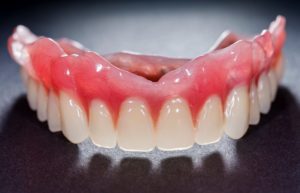
Your dentures are designed to function and feel like a comfortable, natural extension of your smile, allowing you to complete most, if not all of the daily tasks that you could with your home-grown teeth. However, after years of having them, you’ll likely notice complications and other issues crop up as a result of them not fitting your mouth properly. This is because over the years, your jawbone shape will change. When you notice the signs early, you can take action by having your dentist either reline or replace your prosthetic, allowing you to avoid these five effects of ill-fitting dentures below.
Swollen & Sore Gums
When your dentures aren’t properly fitted to your mouth, whether that’s due to the way they were made or the fact that over the years your jawbone shape has changed, it can cause the prosthetic to rub and graze your gumline when you eat and speak. After some time, it will leave your gums swollen, sore, and inflamed, making wearing your replacement teeth increasingly more uncomfortable each day.
Difficulty Speaking & Eating
After the first 30 days with your dentures, speaking and eating should feel more natural. If you notice that down the road, they often shift and move in your mouth, it will cause you to develop lisps, slur your words, and even make chewing basic foods difficult. This is often the result of them not securely fitting atop the gumline, so they aren’t able to utilize the natural suction to stay securely in place.
Oral Blisters & Sores
Due to the fact that your prosthetic no longer fits properly over the contours of your gumline, it can cause them to repeatedly rub over your soft tissue, causing blisters and sores to develop. Not only can this be incredibly uncomfortable, but it can also increase your chances of developing an oral infection, gum disease, and other problems.
Saliva Accumulation
Your dentures are crafted in a way to balance your bite, so when you close your mouth, your teeth come together evenly, making sure that one jaw joint doesn’t sustain additional strain or tension. If your bite isn’t even, it could cause saliva to build-up at the corners of the mouth, leading to an overgrowth of yeast and a bacterial infection. This can lead to itchiness, pain, and other uncomfortable symptoms.
Frequent Headaches
In addition to saliva accumulation, an imbalanced bite due to ill-fitting dentures can also lead to headaches. This is because there are nerves within the jaw connected to the rest of the body that can be triggered when the joints and muscles surrounding them are strained, including causing headaches.
About the Author
Dr. Rafiq Hirji has over a decade of experience. Throughout those years, he has helped hundreds of patients regain their smiles through providing perfectly-fitted and natural-feeling traditional and implant dentures. He offers start-to-finish dental implant treatment as well as denture relining and routine checkups. For questions or to learn whether it’s time to replace or reline your prosthetic, visit Daily Smiles MacArthur’s website or call 972-546-4114.
